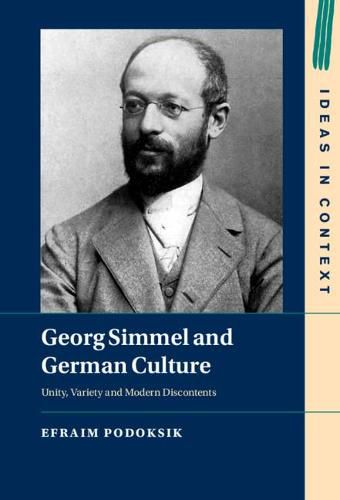Georg Simmel and German Culture: Unity, Variety and Modern Discontents
Efraim Podoksik (Hebrew University of Jerusalem)

Georg Simmel and German Culture: Unity, Variety and Modern Discontents
Efraim Podoksik (Hebrew University of Jerusalem)
The significance of the German philosopher and social thinker, Georg Simmel (1858-1918), is only now being recognised by intellectual historians. Through penetrating readings of Simmel’s thought, taken as a series of reflections on the essence of modernity and modern civilisation, Efraim Podoksik places his ideas within the context of intellectual life in Germany, and especially Berlin, under the Kaiserreich. Modernity, characterised by the growing differentiation and fragmentation of culture and society, was a fundamental issue during Simmel’s life, underpinning central intellectual debates in Imperial Germany. Simmel’s thought is depicted here as an attempt at transforming the complexity of these debates into a coherent worldview that can serve as an effective guide to understanding their main parameters. Paying particular attention to the genealogy and usage of the concepts of Bildung, culture and civilisation in Germany, this study offers contextual analyses of Simmel’s philosophies of culture, society, art, religion and the feminine, as well as his interpretations of Dante, Kant, Nietzsche, Schopenhauer, Goethe and Rembrandt.
This item is not currently in-stock. It can be ordered online and is expected to ship in approx 2 weeks
Our stock data is updated periodically, and availability may change throughout the day for in-demand items. Please call the relevant shop for the most current stock information. Prices are subject to change without notice.
Sign in or become a Readings Member to add this title to a wishlist.


